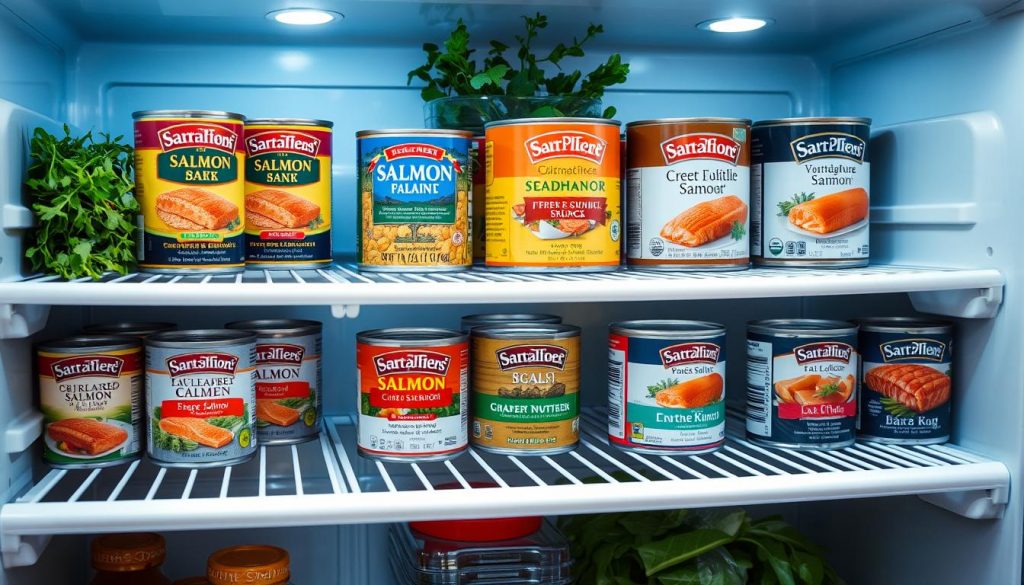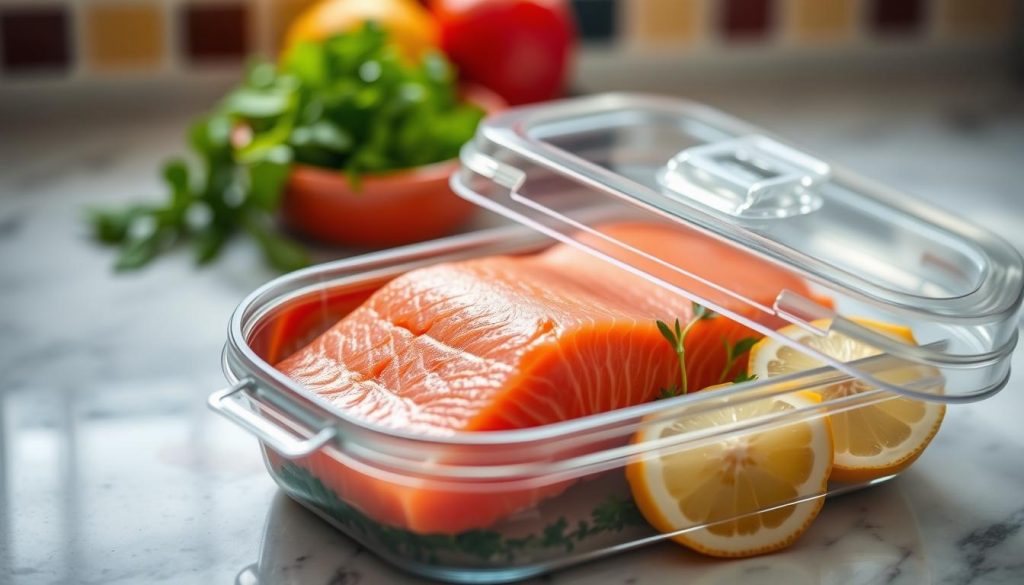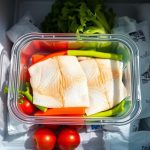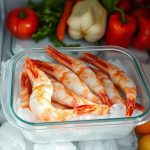Canned salmon is a nutritious and convenient pantry staple. It’s important to know how to store it properly. Let’s explore how to keep this versatile food fresh and safe.
Unopened canned salmon can last up to 3 years in your pantry. Once opened, transfer it to an airtight container. Store it in the fridge for 1-2 days.
Food safety is crucial for seafood. Follow proper storage guidelines to enjoy canned salmon without worry. Refrigeration slows bacterial growth, maintaining freshness and preventing illness.
Key Takeaways
- Unopened canned salmon lasts up to 3 years in the pantry
- Once opened, store in an airtight container in the fridge
- Consume refrigerated opened canned salmon within 1-2 days
- Proper storage is key to maintaining freshness and safety
- Canned salmon is a nutritious, ready-to-eat protein source
Understanding Canned Salmon Storage Basics
Canned salmon is a handy and healthy choice for fish fans. Let’s look at how it differs from fresh salmon. We’ll also cover storage methods and food safety tips.
What Makes Canned Salmon Different from Fresh
Canned salmon goes through a special process to make it last longer. This means it doesn’t need to be kept cold when unopened. You can store it in your pantry for up to five years.
Fresh salmon, on the other hand, needs to be refrigerated. It also has a much shorter shelf life than canned salmon.
Importance of Proper Storage Methods
Storing canned salmon correctly keeps it safe and tasty. Keep unopened cans in a cool, dry spot away from sunlight. Once opened, put the salmon in an airtight container in the fridge.
This stops it from going bad and helps keep its flavor and texture.
Food Safety Considerations
Always check cans for damage or swelling before opening. After opening, treat canned salmon like fresh fish. Eat it within 1-2 days.
Use clean tools and store opened salmon away from other foods in the fridge. This helps prevent the spread of germs.
| Storage Method | Shelf Life | Temperature |
|---|---|---|
| Unopened (Pantry) | Up to 5 years | Room temperature |
| Opened (Refrigerated) | 1-2 days | 40°F (4°C) or below |
Knowing these storage basics helps us enjoy canned salmon safely. We can keep it fresh and tasty for our meals.
How Long Does Canned Salmon Last in the Fridge?
Proper storage is vital for opened canned salmon. It keeps the fish fresh and safe to eat. Let’s explore how long canned salmon lasts in different storage conditions.

Unopened canned salmon can last up to 5 years in a cool, dark pantry. Some say it might last indefinitely. For best quality, use it within 6 years.
Once opened, canned salmon’s shelf life shortens. Put it in an airtight container in the fridge. It will stay fresh for 3 to 4 days.
| Storage Method | Duration |
|---|---|
| Unopened (Pantry) | Up to 5 years |
| Opened (Refrigerated) | 3-4 days |
| Frozen (After Opening) | Few months |
Freezing opened canned salmon extends its life. It can last a few months frozen. For best quality, eat it within 3 months.
Good storage keeps canned salmon fresh longer. It also maintains the fish’s nutritional benefits. Follow these tips to enjoy your salmon at its best.
Storing Unopened Canned Salmon
Proper storage keeps canned salmon fresh and tasty. Let’s explore the best ways to store unopened cans. These tips will help maintain the salmon’s quality.
Pantry Storage Guidelines
A cool, dark pantry is perfect for canned goods. Unopened canned salmon can last up to 3 years when stored right. Keep cans dry and away from sunlight and heat.
Temperature Requirements
Temperature control is key for preserving canned salmon. Store it below 85°F (29°C). Avoid places with big temperature changes. This helps protect the can’s seal and the salmon’s quality.
| Storage Location | Recommended Temperature | Maximum Storage Time |
|---|---|---|
| Pantry | Below 85°F (29°C) | Up to 3 years |
| Refrigerator (opened) | 40°F (4°C) or below | 3-4 days |
| Freezer | 0°F (-18°C) or below | Up to 3 months |
Best Storage Locations
Pick a cool, dry cupboard or pantry for your canned salmon. Avoid damp areas like basements or garages. Organize cans by expiration date, with older ones in front.
This system helps you use the oldest cans first. It keeps your salmon fresh and reduces waste.
These tips will extend your canned salmon’s shelf life. You’ll always have a nutritious, protein-rich meal option ready. Check for damage or bulging before opening a can.
Proper Storage After Opening
Opened canned salmon needs proper storage for safety. Let’s explore the key steps to keep your salmon fresh and safe to eat.
Transfer to Airtight Containers
Move the salmon to an airtight container right after opening. This keeps it fresh and prevents contamination. Airtight storage preserves flavor and texture while blocking unwanted odors.

Refrigeration Requirements
Store opened canned salmon at or below 40°F (4°C). This slows bacterial growth. In the fridge, it typically lasts 3-4 days. Consume the salmon within this timeframe for best quality.
Avoiding Cross-Contamination
Keep salmon separate from raw meats and other foods. Use clean utensils when handling it. Avoid touching it directly with your hands.
These practices help maintain food safety. They also prevent foodborne illnesses.
- Use clean containers and utensils
- Store salmon on a lower shelf to prevent drips onto other foods
- Label the container with the date of opening
Follow these guidelines for airtight storage and proper refrigeration. Avoid cross-contamination to enjoy your canned salmon safely for several days after opening.
Signs of Spoiled Canned Salmon
Knowing how to spot spoiled food is key to staying safe and enjoying quality salmon. Here’s a list of signs that show when canned salmon has gone bad.
First, check for an off-putting smell. Fresh salmon should have a mild, ocean-like scent. If it smells sour or like ammonia, throw it away.
Next, feel the texture. Spoiled salmon often feels slimy. If it’s sticky or mushy instead of firm, don’t eat it.
Look for visual clues too. Check for any odd colors, dark spots, or mold on the salmon. These are clear signs of spoilage.
Inspect the can itself. Don’t open it if it’s bulging, rusted, or damaged. These issues may mean harmful bacteria are inside.
| Spoilage Indicator | What to Look For |
|---|---|
| Odor | Sour or ammonia-like smell |
| Texture | Slimy, sticky, or mushy |
| Appearance | Discoloration, dark spots, mold |
| Can condition | Bulging, rust, or damage |
Trust your instincts when checking canned salmon. If something seems off, it’s better to be safe than sorry. Toss out any questionable salmon to avoid getting sick.
Best Practices for Maximum Freshness
Fresh canned salmon tastes better and is safer to eat. Here are some tips to keep your salmon in top shape after opening.
Container Selection Tips
Pick the right food storage containers for your salmon. Use airtight, BPA-free containers to lock in freshness. Glass or high-quality plastic options work best.
These containers prevent air exposure and maintain the salmon’s flavor. Choose wisely to keep your fish at its best.
Temperature Control Methods
Proper temperature is key to preserving salmon. Store opened cans in the fridge at 32°F to 38°F. This slows bacterial growth and keeps salmon safe for 3-4 days.
Handling Guidelines
Follow these food handling practices to maximize freshness:
- Use clean utensils when serving salmon to prevent contamination
- Label containers with the opening date to track freshness
- Consume opened canned salmon within 3-4 days
- For longer storage, freeze salmon for up to 2-3 months
| Food Item | Refrigerator Shelf Life (Opened) | Freezer Shelf Life |
|---|---|---|
| Canned Salmon | 3-4 days | 2-3 months |
| Fresh Salmon | 1-2 days | 3 months |
| Cooked Salmon | 3-4 days | 2-3 months |
These guidelines will help keep your canned salmon fresh and safe. You’ll be able to enjoy it in many tasty recipes.
Nutritional Benefits of Canned Salmon
Canned salmon is a nutritional powerhouse. It’s a versatile protein source that offers numerous health benefits. Let’s explore the impressive nutritional profile of this pantry staple.
Canned salmon is packed with protein. One serving provides 40% of your daily protein needs. It’s perfect for muscle building and repair.
This fish is also rich in omega-3 fatty acids. A single serving supplies 63% of your daily requirement. Selenium, crucial for thyroid and immune health, is another key nutrient.
Traditional packs with skin and bones offer more omega-3s. They contain nearly twice the amount compared to skinless and boneless varieties.
| Nutrient | % Daily Value per Serving |
|---|---|
| Protein | 40%+ |
| Omega-3 Fatty Acids | 63%+ |
| Selenium | 42%+ |
Sodium content in canned salmon varies by brand. It ranges from 200 to 320 milligrams per serving. Choose lower sodium versions for better health benefits.
Canned salmon has lower mercury levels than canned tuna. This makes it safer for regular consumption. It’s an excellent choice for boosting protein and omega-3 intake.
Adding canned salmon to your diet is a smart move. Its rich nutritional profile supports overall health and well-being. Enjoy this delicious and nutritious food in your meals.
Creative Ways to Use Leftover Canned Salmon
Canned salmon is a versatile ingredient that can upgrade your meals. Let’s explore some quick and tasty ways to use this fish. We’ll turn this Depression-era staple into modern, delicious dishes.
Quick Meal Ideas
Make a tasty salmon salad for four sandwiches. It stays fresh in the fridge for 3-5 days. Try a sushi bake by layering flavorful salmon over sushi rice.
Pasta lovers can toss drained salmon flakes with garlic and parsley. This simple dish is both satisfying and easy to make.
Recipes for Leftovers
Turn leftover salmon into hearty burgers with dill, lemon, and capers. For cold nights, try a warming Nordic fish chowder using canned salmon.
Feeling adventurous? Try the Russian delicacy salmon coulibiac. Wrap salmon, rice, and veggies in a pastry crust. For brunch, make frittatas and quiches with canned salmon.
Storage-Friendly Preparations
Create freezer-friendly salmon burgers or casseroles for easy meal prep. Swap salmon into your favorite tuna casserole recipe for a new twist.
When making salmon rice bowls, store components separately for freshness. They’ll last up to two days. Choose canned sockeye salmon for its taste and high omega-3 content.




